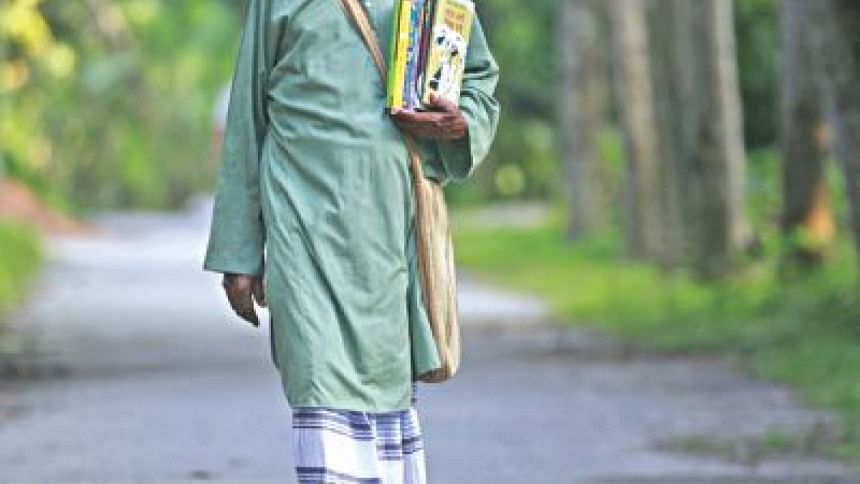Polan Sarker laid to rest beside his library

Ekushey Padak winner Polan Sarker, also known as 'the walking library', has found his final resting place next to the library he had built at his village home Bausa in Rajshahi's Bagha upazila.
Yesterday around 10:15am, before the burial, thousands from near and far poured in at the playground of Harunur Rashid Shah High School that also had his contribution during its founding.
They gathered there to offer namaz-e-janaza and to show last respect to the man revered for his life-long passion for disseminating knowledge through lending books, by walking on foot for miles.
Many of the school's present and former students paid solemn tribute to Polan Sarker for touching their lives through books that they had received from him for their outstanding results at the school each year.
Rajshahi Deputy Commissioner SM Abdul Kader was present on the occasion with a floral wreath. He conveyed a condolence message from Prime Minister Sheikh Hasina to Polan Sarker's family members.
The DC also announced that he would take initiatives for nationalising the school and for naming a building of the school after Polan Sarker.
Rajshahi Superintendent of Police Md Shahidullah said the country is mourning the death of Polan Sarker.
Admirers from all walks of life including political, business, cultural and social personalities from surrounding areas attended the janaza.
Polan Sarker breathed his last at his home around 12:30pm on Friday, aged 98.
Born as Harez Uddin in Natore's Bagatipara upazila on September 10, 1921, Polan Sarker was a self-made man with a passion for learning.
After his father's death, Polan could not continue schooling after class six. But his eagerness to learn did not wane.
He developed a habit of buying books from local libraries, gradually becoming a voracious reader.
Soon Polan became skilled enough in Bangla to be hired for writing legal deeds, business agreements, and keeping meeting minutes.
After he was diagnosed with diabetes in his 80s, he was told to walk at least three kilometres a day. He used this as an opportunity to walk to villagers' homes and lend them his own books.
He continued to hand-deliver the books for almost three decades.
In 2008, he built the library on his own land.

 For all latest news, follow The Daily Star's Google News channel.
For all latest news, follow The Daily Star's Google News channel. 





Comments